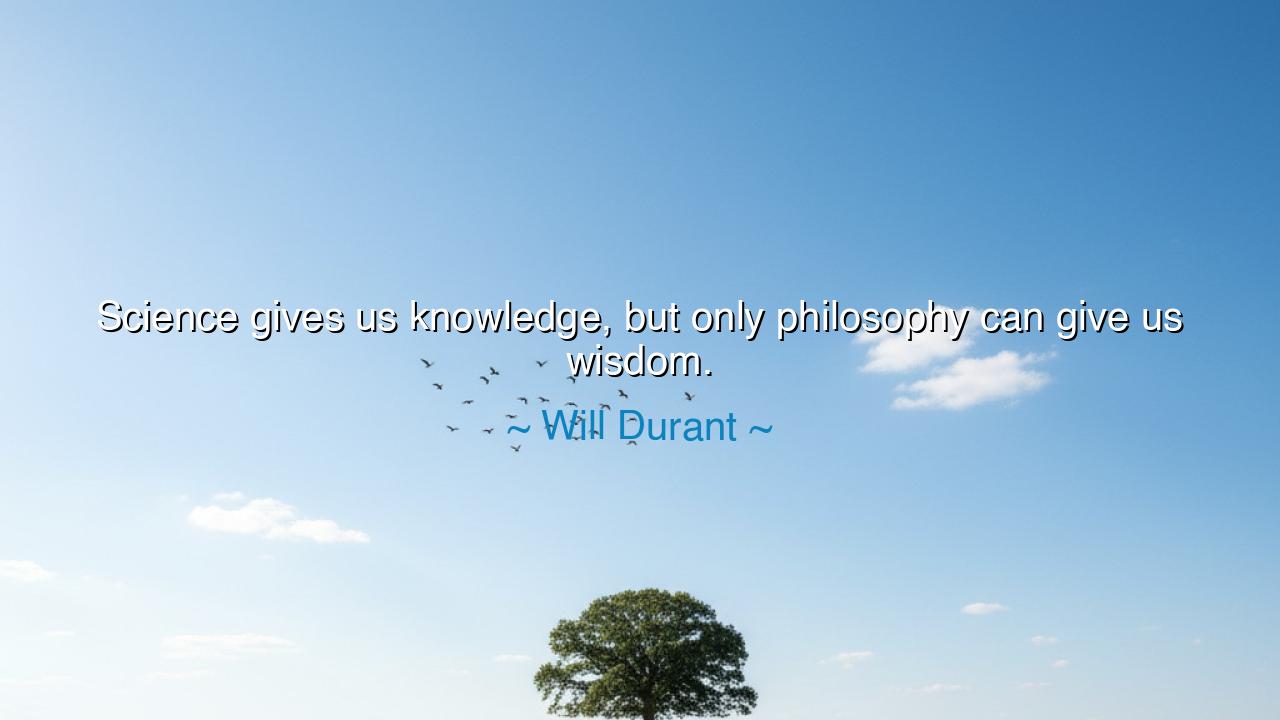
Science gives us knowledge, but only philosophy can give us






Will Durant, the great historian of civilization, once declared: “Science gives us knowledge, but only philosophy can give us wisdom.” These words strike like a bell through the ages, reminding us that facts alone cannot guide the soul. Knowledge is the accumulation of truths about the world—how stars burn, how rivers flow, how the body breathes. But wisdom is the art of using that knowledge rightly, shaping life, guiding action, and lifting humanity beyond mere survival. Without philosophy, science is a ship with sails but no rudder, swift but directionless.
The ancients knew this well. The Babylonians charted the stars, the Egyptians measured the floods of the Nile, and the Greeks studied numbers and motion. Yet their greatest gift was not measurement, but reflection. Socrates, though he left no book of facts, taught that an unexamined life was unworthy. Plato turned the gaze of men from the shadows of the cave to the light of truth. Aristotle gathered both science and philosophy, insisting that to know what a thing is was not enough—we must also ask what it is for. Thus, from the beginning, knowledge without wisdom was seen as half a gift, incomplete and dangerous.
Consider the story of the atomic age. In 1945, human science had reached its pinnacle in the creation of the atom bomb. With a single weapon, entire cities could be destroyed, and the balance of power in the world forever shifted. The scientists had achieved magnificent knowledge: they had split the atom, uncovered the deep laws of energy. But the question of how such knowledge should be used was not answered by science. It was a question of wisdom, of ethics, of philosophy. And because wisdom lagged behind, the mushroom clouds rose over Hiroshima and Nagasaki, and humanity stood trembling at its own power.
This is what Durant warns us of. Science can tell us how to build a machine, but not whether that machine should be built. It can cure disease, but it cannot teach us how to live rightly with health. It can extend life, but it cannot explain what makes life worth extending. For that, we need philosophy—the love of wisdom, the search for meaning, the discipline of asking “Why?” when all the world is content with “How?”
Yet Durant does not set philosophy against science. He honors both, as twin pillars of civilization. But he reminds us that knowledge alone, no matter how dazzling, is not the highest good. To know and not to understand, to master facts and yet be a slave to folly, is to be like a child wielding the sword of a king. Only when wisdom rules can knowledge become light, rather than fire.
The lesson, then, is this: pursue knowledge, but do not stop there. Let every fact you learn raise a question in your soul: What does this mean? What is it for? How shall I use it for good? Seek teachers who not only instruct your mind, but awaken your conscience. Read the philosophers, ancient and modern, who remind us that truth without virtue is hollow.
And in your daily life, practice philosophy not as dry argument, but as living wisdom. When you speak, ask if your words build or destroy. When you act, ask if your deeds serve justice or vanity. When you learn, ask not only “What is true?” but “How can this truth serve life?” In this way, you will unite the gifts of science with the crown of philosophy, and walk the path not only of the knowledgeable, but of the wise.
Children of tomorrow, carry Durant’s words as a torch: knowledge without wisdom is power without direction; but when married together, they become the flame that can light the world. Seek both, and you will not only know much—you will live greatly.






AAdministratorAdministrator
Welcome, honored guests. Please leave a comment, we will respond soon